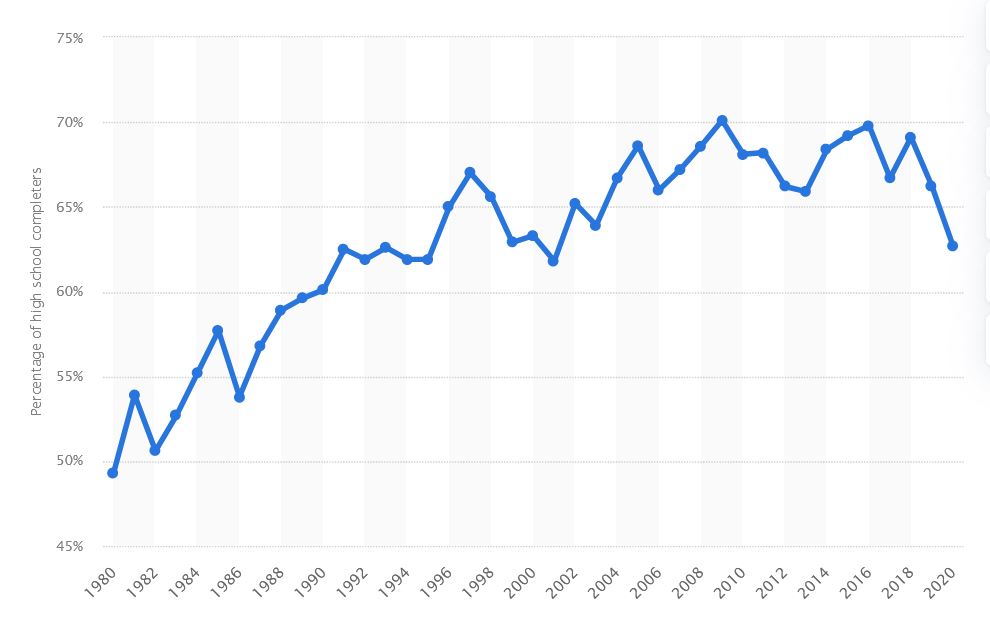People talk about the attributes of different generations, and it got me wondering who names the generations. They aren’t doing a good job: Baby Boomers, Generation X, Millennials, Generation Y and Generation Alpha.
This article from the Pew Trust explains some of it. Big national events and trends shape the children, giving the generations different characteristics.
No official commission or group decides what each generation is called and when it starts and ends. Instead, different names and birth year cutoffs are proposed, and through a somewhat haphazard process a consensus slowly develops in the media and popular parlance. Because generations are often shaped by specific events, their labels and spans sometimes differ from one country to another; here, I’ll focus on the U.S.
Generation X (1965 to 1990)
The post-boomer generation, born in the 1960s and ’70s, went unnamed until the 1990s.
Gen X grabbed boomers’ individualism and purified it, situating it squarely within the winner-take-all capitalism of the 1980s and embracing the new opportunities for women and minorities. The birth year boundaries of Gen X are debated but settle somewhere around 1965–80.
Gen X went unnamed until well after it was over because it isn’t defined by an event, but by a trend. Baby Boomers weren’t alive for World War 2, were for the Vietnam War. Vietnam was scary particularly because there was a draft and lists of casualties were posted in the newspaper. College deferments were an option.
In the 1980’s, with Reagan as president, the economy took off.
Attending college is the trend that defined Gen X. This graph shows the percentage of students who enrolled in college immediately after high school graduation. For the 20 years prior to 1980, it’s about 50%, with annual variations. When the first Gen X’ers were college age, about half went to college. By the time the end of the generation, it was about two-thirds.

Going to college exposes students to a wider variety of people and lifestyles. A student going directly to college is more likely to have a white collar job, travel and care about world events and culture. College students are more likely to be exposed to computers and the early internet.
Gen X is a dumb name for the Cosmopolitan Generation.
Millennial Generation (1981 to 1996)
Howe, who helped name the millennials, has suggested that members of this group be called “homelanders” after their upbringing in the time of Homeland Security. However, I doubt that anyone will want to be named after the government agency that makes you take your shoes off at the airport.
The years of the Millennial Generation may not be correct.
I was in class when the 9/11 attack occurred in 2001. My outstanding principal, Carol, made an announcement that a disaster just happened. Since Carol was a delightful person, I remember thinking that a cat was stuck in a tree. By the time my morning classes were over, the 9/11 attack was also, and we had some idea what had happened.
My students in the afternoon classes were aware of the attack. Everyone was stunned. I was proud of myself for knowing what to do. I told my students that “We don’t know how this is going to play out, but the world will change.” Also, “However this play out, America is going to need smart people who understand physics, so we will press on.”
It isn’t good to spend all period fretting, and the students were pretty talked out by this point. Getting some work done was the best approach.
Millennials were defined by 9/11, but that probably only goes up to those born before 1990 or so.
In 2007, the iPhone came out. In 2008, Facebook surpassed MySpace as a social media site. It took a few years for social media to become ubiquitous and the social media algorithms to be fine tuned. People born after 1991 or so were more influenced by the rise of social media, then they were influenced by 9/11.
Generation Z (1995 to 2012)
Members of this generation were the first to spend their entire adolescence with a smartphone, so I call them iGen in a nod to the iPhones three-fourths of them own, and define them as those born from 1995–2012.
Some member of Generation Z aren’t even teenagers yet, so we are probably too close to the generation to evaluate it properly. Perhaps we can’t call it anything yet.
The term “iGen” seems okay, but it may miss the point. This generation seems to be defined by social media. They seem to be more interested in matching the general consensus, than being right about something. If they have a question to answer, they want to know what everyone else thinks the answer is, rather than researching the question from primary sources.
I’d suggest they are the “herd” generation.
Generation Alpha (Born after 2010)
My teaching colleagues are well aware that smart phones are detrimental to the development of a child. Texting is a frequent distraction in class. Social media provides constant social pressure. All teachers know that if students have unrestricted access to their smart phones in class, little education will occur. My colleagues with children know the dangers, but still provide their child with a smart phone so their kid doesn’t get ostracized.
Gen Alpha will start when parents routinely provide their children with a flip phone, rather than a smart phone. It is too soon to know what event or trend will shape this generation. Artificial Intelligence is the tempting answer. Maybe.
It may be wishful thinking, but it seems like social justice has nearly run it’s course. Open borders and the climate change cult has reduced the living standards for citizens in many Western countries. We seem to be on the cusp of committing to the madness or turning back from it. In twenty years or so, we can look back and figure out what to call Gen Alpha.